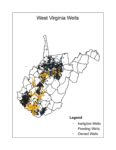Update for Horizontal Wells
Drillers are, under the common law, only supposed to do what is “reasonably necessary” to the surface to get their minerals out — giving “due regard to” and “accommodating” the surface owner’s uses. It is supposed to be a balance. Drillers have many advantages they can use to tilt the balance their way. They have experience, they have money, they have the lawyers, and they have surprise on their side. Also the State will issue them drilling permits even if they are exceeding their common law rights – and many courts do not understand that. About the only tool in the toolbox of a surface owner who cannot afford thousands of dollars for a lawyer to assert their rights under this balance is to establish the surface owner’s use by drilling a water well — or building an occupied dwelling etc.
Below this update is the explanation that still applies to conventional vertical wells. However, the Natural Gas Horizontal Well Control Act was passed by the Legislature in December 14, 2011. It made important changes to the way that the drilling of water wells can limit the drilling of gas wells. (Go here to see a general alert about the Act’s significance.)
First, the Act did increase the distance between water wells and new horizontal gas wells from 200 feet to 250 feet (unless the well is being drilled on a pad where one horizontal well was drilled or permitted prior to passage of the Act.) W.Va. Code 22-6A-12(a) and (d). However, the well pads and other disturbance from horizontal well pads are so much larger that even with the 50 foot increase, the surface disturbance from the drilling can be even closer to the water well. And we think the most common water well pollution will come from spills on or near the pad, so this distance limitation is still far short of what is needed.
Second, not just any water well counts. It has to be a “water well [or developed spring] used for human or domestic animal consumption.” Ibid. So a water well for a water supply to attract or help deer or other wildlife no longer counts. Although a well or spring to supply water for a house or camp, or even a developed campsite would count.
Third, and most importantly, for conventional vertical wells, the water well can be drilled any time prior to the driller actually starting to drill the gas well, so drilling a water well any time before the gas well driller starts drilling should stymie the drilling of the conventional, vertical gas well as described below. We believe this is true even if the driller has already surveyed the site and even if the conventional driller has already obtained a drilling permit. After all, the permit is good for two years, and lots of times drillers have obtained permits and then never drilled wells!
However, the industry-drafted Act (promoted by the Governor and passed by the Legislature in three days) changed that for horizontal wells to which the Act applies. For those horizontal gas wells, the water well has to be drilled prior to the driller sending the surface owner one of two notices of its plans.
One notice the driller can send you is a “notice of planned entry onto the surface tract to conduct any plat surveys,” required for the drilling of the well. W.Va. Code §22-6A-10(a). The State has a form WW-6A-3 that drillers may use, but they might have their own form. This notice, “shall include a statement that copies of the state Erosion and Sediment Control Manual and the statutes and rules related to oil and gas exploration and production may be obtained from the Secretary [of the Department of Environmental Protection], which statement shall include contact information, including the address for a web page on the Secretary’s website, to enable the surface owner to obtain copies from the secretary.” That notice is only good for 7 to 45 days. Ibid.
To avoid giving surface owners notice of their rights, and to hold off the surface owner’s plans for development indefinitely, the other notice is the one the driller is more likely to send to you.. It is a notice of the driller’s “intent to enter upon the surface owner’s land for the purpose of drilling a horizontal well.” W.Va Code 22-6A-16(b). However, this notice appears to have no statutory time limit, and does not have to include a statement that copies of the state Erosion and Sediment Control Manual and the statutes and rules related to oil and gas exploration and production may be obtained from the State Department of Environmental Protection. It only has to include the name, address, telephone number, and if available, facsimile number and electronic mail address of the operator and the operator’s authorized representative. The driller may use a State form WW-6A4.
So if you are in an area in which horizontal drilling is coming your way, and if you have surface uses that you want accommodated for which a water well (or a dwelling — including a vacation cabin etc.) is appropriate, the best mechanism is to drill that water well now (or build that cabin now — there are Amish built structures that can be delivered like a mobile home and then be permanently connected to a foundation.) And you need to do that NOW before the driller has enough interest to send you one of the notices above.
Conventional Wells
The general strategic disadvantages of surface owners.
Oil and gas drillers, by virtue of their lease from the mineral owner, are only supposed to do what is “fairly necessary” to the surface owner’s land to get the gas out. (If the surface owner also owns the minerals and a lease has been signed, then a court’s interpretation of the language of the lease will control what the driller can do.) Unfortunately, in the real world, the driller has the strategic upper hand in many ways.
- The driller has money, experience, lawyers and surprise on its side.
- The state permitting process, including the surface owner’s right to comment on the permit application, does not recognize what rights the surface owner has under the “fairly necessary” rule. That process is concerned about soil erosion and sediment control, and down hole drilling practices – a surface owner’s comments that the well pad and access road are using the surface owner’s most valuable property, or a future home site etc., cannot be used to deny or change the permit. In short, the permitting process only responds to a surface owner’s comments on how the road and well site is built, and not where it is built. (The commenting process can be used strategically to get some leverage. See the West Virginia Surface Owner’s Guide to Oil and Gas .)
- The only way a surface owner is sure to get his or her rights under the “fairly necessary rule” recognized is to go for an injunction in Circuit Court (a risky and expensive law suit that has to be brought immediately) or sue for damages later (when all the surface owner can get is money and not a change to the driller’s plan).
There are some other minor strategies that can be used. See the Guide. But our newest and best advice has to do with the strategic use of the drilling of water wells.
The strategic use of water wells.
Drilling a water well is the most important, though still limited, strategic advantage that surface owners have!
A West Virginia statute says, “No oil or gas well shall be drilled nearer than two hundred feet from an existing water well or dwelling without first obtaining the written consent of the owner of such water well or dwelling.” W. Va. Code §22-6-21. (So be VERY CAREFUL not to sign anything without getting what you want and/or reading it carefully.)
This is an absolute rule. If you get your water well drilled before they start drilling their gas well, they cannot drill their gas well within 200 feet of your water well! So if you have an area of your Land that is a future home site, or a future site of a barn or pasture for animals, or a future site of a camp site or a hunting cabin or a wildlife refuge, viewing or feeding area, or a future site of anything that needs water – then drill a water well!
What if the driller has already staked a gas well site?
The driller has to survey the well site before applying for a well work permit. The surveyor will generally leave a surveyor’s stake at the well site. It is not too late! It has been our experience, and we have believe that is the DEP policy applying that statute, that DEP well not issue a permit if the well site is within 200 feet of a water well.
In addition, at least one Circuit Court Judge has issued a decision that it cannot order the DEP to issue a permit, and it cannot order a surface owner to remove a legal water well, even though the water well was drilled after the driller had staked the driller’s proposed gas well location. The Judge said that was true even though, “Defendants motives to drill water wells on their lots may have been in part to prohibit drilling of a gas well.” In that case the driller staked a location; then the surface owner got a required permit for and drilled a water well; and then the driller began the application process for the well work permit. The DEP inspector would not sign off on the permit due to the closeness of the new water well to the proposed gas well. The driller sued and the Circuit Court Judge, “weighing all the equities of this case,” ruled against the driller and in favor of the surface owner.
The Circuit Court Judge relied on a West Virginia Supreme Court case arising out of a dispute between two adjoining landowners. One landowner was getting ready to put in a septic system. The second landowner got a permit for a water well before the first landowner was able to get his septic system permit, and later had the well drilled. The County would not approve first landowner’s the septic system because it was too close to the permitted water well. The Supreme Court said that the digging of a water well was not a private nuisance even though it precluded landowners from developing a septic system on their property because the septic system would not meet health department regulations governing noninterference with a well water. Note that in making this ruling in this particular case the West Virginia Supreme Court relied on a broad principle of law, called a Syllabus Point, that says that, “An interference with the private use and enjoyment of another’s land is unreasonable when the gravity of the harm outweighs the social value of the activity alleged to cause the harm.” The second landowner won because his water well was not an unreasonable use. The water well was not an unreasonable use because the gravity of harm (precluding the septic tank) did not outweigh the social value of having the water well.
Because the Circuit Court Judge’s ruling was based on this Supreme Court case, we cannot say that a surface owner would win a suit in which the surface owner put a water well every 400 feet across acres and acres of land. Without a reason for the wells that had some social value other than blocking the location of gas wells, the harm caused by the wells in preventing the mineral owner from producing the minerals might be held unreasonable by a court.
What if the driller already has a permit?
What if the surface owner drills a water well, but does not get the water well drilled until after the driller has gotten a permit from the State? Will the driller still be blocked from actually drilling the gas well even though it has gotten a permit?
Although it is a little less certain, we think that a water well that was drilled after the permit has been issued will still prevent the drilling of a gas well. The statute does not say that it is illegal for the State to give the driller a permit if the proposed well is within 200 feet of a water well. The statute says “No oil or gas well shall be drilled nearer than two hundred feet from an existing water well . . . [emphasis added].”
We think that if the surface owner drills a water well after the permit is issued but still be fore the driller starts drilling the gas well, and if the surface owner notifies the oil and gas inspector that the water well has been drilled, then the inspector will prevent the gas well from being drilled. (If they do not, call us!) And if the State will not stop it then you could sue in court to stop it. The DEP and its inspectors, as a matter of law and policy, do not enforce or decide the property rights between the various property owners in this or any other situation. They enforce the laws that protect the environment (at least as they interpret the laws and as they see the environment). Instead, the property rights of the various property owners are decided by the Courts.
No court has ruled on this particular situation. And if indeed the inspector does prohibit the driller from drilling a well, the driller may try to sue the surface owner in Court. (If they do, call us.) But we think the surface owner will win again. All the reasoning that was relied upon by the Circuit Court above when the water well was drilled between the staking and the drilling permit application applies here we think. A drilling permit is good for two years – and then many drillers get drilling permits and then never drill the wells! And how much harm is moving a gas well 200 feet? So the mere obtaining of a State permit should not make a difference.
How do I get a legal water well drilled?
We have not looked that up for you. You need to contact a water well driller or your local county health department to find that out. We know that many counties require permits for the drilling of at least some kinds of wells. We do not know if all counties require permits for the drilling or digging of all kinds of wells. We do not know if water wells that farmers, for example, drill just for animals needs a permit or have to meet special requirements. We know that in the past people relied on “dug wells” that were literally hand dug down to the water table and lined with stones. Those are subject to pollution by septic systems and animal droppings on pastures and the bodies of dead animals that burrow into the well from the side, so we do not advise humans drinking from them without purification. But even those are water wells and the statute says “water wells”. The statute does not say what kind of water wells, although the Circuit Court case does talk about a legal permitted well. The best bet is to follow is to get the best water well you can, but others may work.




